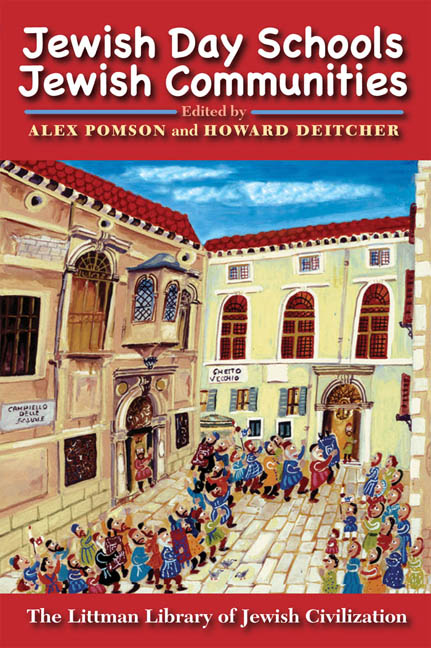Book contents
- Frontmatter
- Dedication
- Acknowledgements
- Contents
- Note on Transliteration
- Introduction: Jewish Schools, Jewish Communities: A Reconsideration
- PART I Insights from Public and General Education
- PART II Cross-Cultural Insights
- PART III Insights through the Prism of Community
- 13 Relationships between Schools and Parents in Haredi Popular Literature in the United States
- 14 The Impact of Community on Curriculum Decision-Making in a North American Jewish Day School
- 15 Ideological Commitment in the Supervision of Jewish Studies Teachers: Representing Community
- 16 Schooling for Change in the Religious World: An Educational Experiment in a Religious Junior High School in Israel
- 17 Home-Made Jewish Culture at the Intersection of Family Life and School
- 18 Teacher Perspectives on Behaviour Problems: Background Influences on Behavioural Referral Criteria and Definitions of Rebellious Behaviour
- 19 Shabbatonim as Experiential Education in the North American Community Day High School
- 20 Teaching Leadership through Town Meeting
- 21 Building Community in a Pluralist High School
- Contributors
- Index
20 - Teaching Leadership through Town Meeting
from PART III - Insights through the Prism of Community
- Frontmatter
- Dedication
- Acknowledgements
- Contents
- Note on Transliteration
- Introduction: Jewish Schools, Jewish Communities: A Reconsideration
- PART I Insights from Public and General Education
- PART II Cross-Cultural Insights
- PART III Insights through the Prism of Community
- 13 Relationships between Schools and Parents in Haredi Popular Literature in the United States
- 14 The Impact of Community on Curriculum Decision-Making in a North American Jewish Day School
- 15 Ideological Commitment in the Supervision of Jewish Studies Teachers: Representing Community
- 16 Schooling for Change in the Religious World: An Educational Experiment in a Religious Junior High School in Israel
- 17 Home-Made Jewish Culture at the Intersection of Family Life and School
- 18 Teacher Perspectives on Behaviour Problems: Background Influences on Behavioural Referral Criteria and Definitions of Rebellious Behaviour
- 19 Shabbatonim as Experiential Education in the North American Community Day High School
- 20 Teaching Leadership through Town Meeting
- 21 Building Community in a Pluralist High School
- Contributors
- Index
Summary
In 2003 Schechter Regional High School opened with the specific aims of developing individual accomplishment, Jewish commitment, and community leadership. Co-heads of school were appointed, one from Jewish education, the other from an independent, non-sectarian school. Both were particularly interested in developing leaders with strong collaborative skills.
The leadership team, known as the LT, consisting of the two co-heads, posited that leadership opportunities would come to Schechter Regional graduates even if the school did nothing to promote this; society looks towards well-educated adults to fill its many leadership needs. The real challenge was to develop effective and ethical leaders capable of meeting these needs. Thus Schechter Regional became a leadership lab with Town Meeting at the centre.
The leadership team chose as its guidebook James M. Kouzes and Barry Z. Posner's The Leadership Challenge because it was so widely used in college and corporate leadership programmes. Kouzes and Posner questioned over 75,000 individuals worldwide on which qualities they most sought and admired in their leaders. Their research identified four foundational qualities for leadership credibility: honesty, looking forward, competence, and inspiration. By studying credible leaders Kouzes and Posner explored the ‘dynamic process of leadership’ and identified five practices of exemplary leadership: modelling the way, inspiring a shared vision, challenging the process, enabling others to act, and encouraging the heart. Since Kouzes and Posner's research subjects were adults, the leadership team was faced with selecting and nurturing those precursory teenage behaviours and habits of mind that would most likely mature, in post-collegiate adulthood, into Kouzes–Posner leadership traits.
Anecdotally, when the team asked adult leaders to identify who in high school most significantly ‘trained’ them for leadership, most identified their sports team coaches. These coaches had encouraged them, in their teens, to extend their training into everyday life; examine their and the opposition's game strategies; practise repetitive core skills; develop habits of initiative and independent thinking; reflect deeply on past performance to prepare for the future; inspire team spirit and good sportsmanship; play to win but learn how to lose well; intuit the full field; and practise, practise, then practise some more. The Schechter team designed its leadership programme on this coaching model.
- Type
- Chapter
- Information
- Jewish Day Schools, Jewish CommunitiesA Reconsideration, pp. 361 - 374Publisher: Liverpool University PressPrint publication year: 2009

